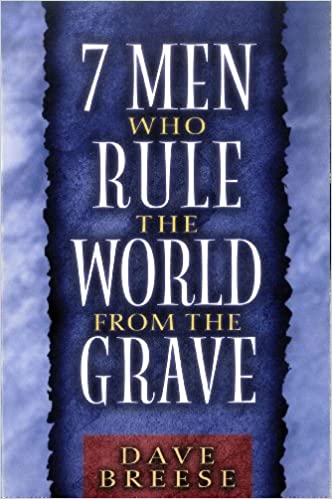A Brief Book Summary from Books At a Glance
By Benjamin J. Montoya
About the Author
Dave Breese (1996—2002) was the president of Christian Destiny Ministries in Hillsboro, KS, and World Prophetic Ministry in Colton, CA. He was known for being an evangelist, author, lecturer, and university speaker who ministered to more than sixty countries. He authored several books including Living for Eternity and Satan’s Ten Most Believable Lies.
Introduction
Everyone is going to die; there is a 100% mortality rate. Some people will be remembered while others forgotten. Usually when influential people die, say a ruler, that marks the end of their reign. But, in this book, Breese surveys and analyzes the thought of 7 men who continue to rule the world from their grave. That is, their ideas were and continue to be so influential that these men continue to rule the lives of these people though they themselves are dead. Although some of the names themselves may be unfamiliar, each name represents an influential thinker within their respective areas of influence: science, politics, literature, psychology, education, and philosophy. Knowing the views of these men and how to think about them from a Christian perspective is what this book is all about.
Table of Contents
Chapter 1 Biology Is Destiny: Charles Darwin
Chapter 2 Thinking Further About Science
Chapter 3 Social Darwinism
Chapter 4 The Ruling Principle for All Humanity: Karl Marx
Chapter 5 Thinking Further About Marxism
Chapter 6 Closing the Book: Julius Wellhausen
Chapter 7 The Coming of the Strange Fire
Chapter 8 Looking Within: Sigmund Freud
Chapter 9 The Vast Emergence: John Dewey
Chapter 10 New Hope for the Nations: John Maynard Keynes
Chapter 11 The Advent of Diffusion: Søren Kierkegaard
Chapter 12 Who Shall Overcome?
Summary
Chapter 1: Biology Is Destiny: Charles Darwin
Biology is usually a course that is reserved for high school students. In the course of that study, students will quickly stumble across the topic of “evolution.” Charles Darwin is the father of modern evolutionary theory. This theory consists of several parts. First, it involves the notion of what he called, and we continue to call, natural selection. This concept claims that if species evolve in ways profitable to their existence to give them a better chance of survival; this process happens naturally and is selected to help propagate its new and modified form. He based this argument on the changes, or adaptations, he saw in animals. He, then, concluded: “To sum up on the origin of our domestic races of animals and plants, changed conditions of life are of the highest importance in causing variability, both by acting directly on the organization, and indirectly by affecting the reproductive system.” This argument has convinced many within science; in fact, it is often assumed to be true without question.
But the argument has problems because it is circuitous. The survival of the fittest only means the survival of the survivors, not that they survived because of some kind of natural selection. To make that claim after looking at who survived is false, and it could not possibly even be proved to be true, as the scientific method would require for any other scientific claim outside of evolution. There are more problems with this position when considering what science really is, as chapter two will help us consider.
Chapter 2: Thinking Further About Science
Science, at its core, is about observation. First, it consists of a careful, codified, patient recorded observation than merely observing that it is sunny outside. Second, it usually involves a combination of entities, something like “This rock and that moss usually go together.” Third, science involves phenomena. Phenomena are normally in motion, e.g., matter changing from one form to another. Fourth, science performs experiments to test its observations and conclusions. Science, at its core, is empirical. It seeks to observe before drawing conclusions. Many things in life can be observed.
[To continue reading this summary, please see below....]The remainder of this article is premium content. Become a member to continue reading.
Already have an account? Sign In
